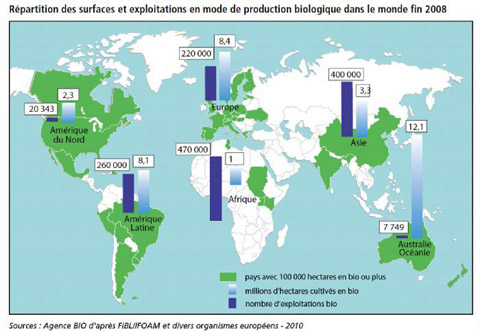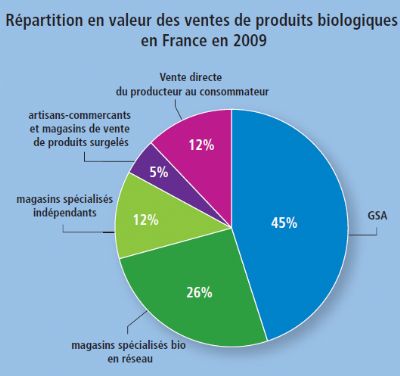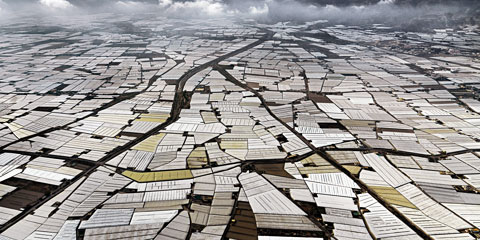With a turnover increased 19% in 2009 for organic products, the sector has the wind in its sails. Long abandoned by supermarkets and manufacturers because considered marginal, the bio has become for them must.
The problem is that we are facing a industrialization of organic. It is necessary to, After the manner of conventional products, appeal to the largest number by creating sanitized products, well packed, to taste goes everywhere.
The large distribution does not turn to small craft manufacturers, who can provide enough food and a floor price, but to the large industrial groups which are absorbed this juicy market.
This is the era of organic farming intensive and industrial with the monocultures, the monoelevages gigantic, to the development of’import food from the other side of the world, to the relief of the specification of labels bio, to the non-respect of workers, to the Standardization of costs, etc. As stated so well Picard, for example, "Need us bio beauty..
We are thus witnessing a perversion of ideology “bio” origin of the small peasantry, that cultivate ancient varieties with unique flavors in respect for the Earth and the environment.
An industrial size
End 2008, more than 35 million hectares are cultivated in organic agriculture in the world, According to IFOAM (International Federation of Organic Agriculture Movements). The new European regulation allows a breeder to produce up to “75 000 chickens bio meat year-round and do not limit the size of farms organic laying hens”. Bionest making organic strawberries in Andalusia has 500 hectare greenhouses. AgriEco product, with its 160 hectares of greenhouses, more than 11 000 tons Peppers, tomatoes and organic cucumbers [1].

Import : products off season with less taste
60% of organic fruit and vegetables are imported into France. ProNatura, the current market leader, has been the bio first to commercialize fruits and vegetables out of season. It does not seem surprising for the consumer to find radius of Strawberry bio or not, in the month of January for example. These imports yet promote the greenhouse gas and significantly increase costs products. According to WWF, a fruit imported off-season by aircraft is 10 to 20 times more consumer of oil that the same fruit bought locally and in season. All this is not to mention the taste of the fruit that will not be as many flavours as often picked a less mature. The taste is also often less good, less pronounced because emphasis varieties with high yields, resistant to transport, which keep well, etc. at the expense of flavours.
Regulation arranged
Large cooperatives, who have financial interests in the GMOS, influence regulatory institutions to such an extent that a new European regulation allows for 0.9% of GMOs in organic products and the possibility of using the pesticides When there is no equivalent, While the European Parliament was opposed ! The farmer and activist by Nature and progress, Guy Kastler leaps “The bio is completely incompatible with GMOs […] We continue to demand 0% of GMOs! The new regulation defines standards and can desire agricultural practices. It is passed to an obligation of means to an obligation of result. This is the doorway to the generalization of industrial organic agriculture”.
While in France it was necessary that organic farmers produce 40% food for their animals on their land, the new European regulation requires not. Food, consisting primarily of soybean, is imported as much cheaper, the same problems that the imported fruits and vegetables seen above.
Enslaved producers
Daniel Florentin, Member of the peasant Confederation says that “producers are under tight contracts and lose their autonomy. They are heavily indebted for at least twenty years and must deliver the totality of their production to the cooperative, which is committed to take, without predetermined price. It is a pure integration system, current in conventional intensive farming».
Small producers of organic soybeans in Latin America depend on large companies to export and “refuse visits of the press”, that is to say the lack of transparency of the groups.
Ecological and sociological disaster
The example of Strawberry bio
The Bionest in Spain company, for example, grown under hundreds of hectares of greenhouses one organic Strawberry variety which is “particularly polluting and exploiting manpower”. This company is located among many other more or less illegally in the natural park of Doñana (world heritage of Unesco) According to WWF-Spain. The culture technique is very similar to that of conventional crops (drip, use of fertilizers, monoculture…).
Bionest employment of women, for the harvest of their fruits, who come from Romania, Poland, of the Philippines, who don't know their rights and are totally subjected to their employers (prohibition of visits, passports confiscated, outputs controlled, etc.). The working conditions are especially difficult for them and are not different from those of the conventional enterprises. According to the diplomatic world “Bionest isn't a case isolated in Andalusia”.
José Bové at the press conference at the European Parliament in Strasbourg (2010) :
Here is an episode of Capital broadcast on M6 to better realize what is farming of strawberries in Spain :
The example of organic palm oil
L’Palm oil bio It is part of the ingredients of most processed organic products. In Colombia, the Daabon group is a multinational company that owns the thousands of hectares of Oil Palm, banana, cocoa and organic coffee. The Davila family, group owner, is in close relationship with former president Alvaro Uribe that has, During his two terms, Clerk of thousands of murders with the army and who with the help of paramilitaries did move massively peasants of their land for that companies can plant bio oil palms.
We see with these two examples as a bio monoculture very large-scale, that violates the rights, the conditions of work and life of men and destroys the environment, is a real drift to “bio ideology”.
To a control of seed
A member of the Verde, a small agricultural cooperative created in the years 1980, far from the abovementioned derivatives, says that “If organic farming is not used to restore fairness, justice, autonomy, self-sufficiency and food sovereignty, It makes no sense. And certifiers are not helping. A farmer who diversified their crops and cultivates several varieties will be more heavily taxed than one who does the intensive monoculture».
These small farmers cannot also, due to certain laws, certify their ancestral seeds. European legislation requires that organic certified seed should be used and that if they do not exist it is possible to use the conventional. “For the moment, everything happens at the edge of legality, But if tomorrow the sale of our products is prohibited, It will require us to grow with organic seeds sold by Monsanto».
There is also the problem of the crossing of the seed between organic crops and GMO crops. This is for example the case in Spain in Aragon where 80% corn bio is contaminated by GMO fields surrounding (by the wind, rain, etc.).
The problem of the bio in France
“The French love the bio-even if it costs them more-, they buy and ask for more. Paradoxically, the second agricultural power in the world is unable to provide bio. Distributors are therefore forced to import massively.” says the Express. And adds “Bio in France, It is the story of the Hare who starts the race, run out of steam, slows down, stops and is overtaken by all its competitors.”
Vincent Perrot, speaker to the National Federation of organic farmers explains «» The political will to support the bio has so far been little, […] The agricultural France is marked by intensive agriculture, dominated by the lobby of large farms. "Our culture was too long that produce more for export more.. In the country which is the 1st consumer of pesticides in Europe, the bio is not seen very positively of the chemical.
The large cereal “who swear by the great returns” are more resistant to convert to organic thus penalizing the entire food production chain because it takes, as we have seen, some organic cereals to feed organic livestock.
Movements against the intensive industry bio
There is in many countries more in addition to peasants and small cooperatives that are resistant against the industrialization of bio and who advocate for responsible management of organic products.
“Defence of peasant seed networks grow to impose the right of farmers to produce and market their own seed” Note Le Monde Diplomatique.
 Bio consistency is a brand new, a new private label, created by FNAB (National Federation of organic farming) who will complement current regulation but which will be much stricter (0% of GMOs, a farm is to be 100% bio, animal feed 100% produced mostly by the farm itself, 100% bio ingredients in processed products, etc.).
Bio consistency is a brand new, a new private label, created by FNAB (National Federation of organic farming) who will complement current regulation but which will be much stricter (0% of GMOs, a farm is to be 100% bio, animal feed 100% produced mostly by the farm itself, 100% bio ingredients in processed products, etc.).
The AMAP (Associations for maintenance of peasant agriculture) which are directly related to consumers and producers are so successful that they are unable to meet the demand.

We are, of course, for consumption of products bio but on condition that it is thoughtful and responsible. On the be repeated not enough, to eat as possible to seasonal and local products ! We also recommend d’avoid bio meals, usually containing various additives, Palm oil, too much salt, or even of GMOs, etc. Prefer raw products, unprocessed, take the time to cook and discover the flavours of original authentic varieties grown near you !
Here is a little picture of the Nicolas Hulot Foundation to consume fruits and vegetables of the season : Fruits and vegetables of the season
Similar article
Main source :
[1] Le Monde Diplomatique – February 2011 – Thriving industry of organic agriculture – Written by Philippe Baque.Philippe Baque, journalist and documentary filmmaker, is coordinator of the project of collective work "of the organic alternative to the 'bio' derivatives - business., what meaning to give to the bio ? "led by the association Alterravia (see here for more details).
Secondary sources :
Bio Agency (www.agencebio.org)
Bio www.organic-market.info (www.bio-Marche.info)
The express : The incredible failure of the organic french


a big thank you !
Or how the agri-food industries absorbed a juicy market !
Soon we'll maplus can do confiiance logos…
It is not a scoop…
Last night on Capital they said that 20% fruit and organic vegetables exceeds the authorized rate ! Scary !!
After buying bio “made in France” We surely limit case as there is bcp more controls than in Egypt etc…
Hello – I am the author of the article of le Monde diplomatique that inspired a great part of your text. Most of the time the information you listed are not presented as quotes… I regret this because this is the result of a long work. You don't quote once my name. It does not matter. But you could have at least indicate the project of collective work which are currently eight authors and which I am the Coordinator. The website of the association bringing This project was given by the diplo world. it Is… Read more "
Hello M. Bailey, I would firstly like to thank you for the wonderful work you have done, you and your employees. Your work has been the basis of my article. When I read your article in le Monde Diplomatique I rushed to write a small summary to share this essential information that stick with the theme of my website. I am sorry to have somewhat overlooked the quote from my sources (I'd be more vigilant next time). I hope that now the shooting is rectified. I wish you, you and… Read more "
It would be more accurate to replace “I rushed to write a little summary” by “I hurried paraphrase”.
The only correct way to share an article that you like is to give the link to your readers, No to reformulate it in full, Add 2 graphics, to get to the original content.
Thanks for this interesting file!
It would require that these information are disseminated more regularly and more intensively to better defend naive consumers and abused by both processes of marketting.
As if we had more aware daily of the conditions for breeding and slaughter of animals for meat our eating habits would change radically.
”animal feed 100% produced mostly by the farm itself” for the new logo ? HAHAHAHAH.
What I no longer includes, is eating local products, I want well, but they are not “bio”, farmers use pesticides and other products. It changes what in this case ? If it can not be trusted with the bio of large surfaces, to Biocoop who abuses the price elsewhere. What should I eat ?
Do not confuse peasants and farmers who adopt a contact with earth differently. If the farmer can engulf unscrupulous in the industry, the peasant working priori with a lot more carefully his land. The local does not mean that it is the farmer who produced in mass next to home, but a person who works with the seasons and without pesticides.
M Hat. Philippe Braque and his team for this great work “borrowed” by F. Boyat which as stated Lekaj was mainly paraphase … I'm from Quebec and I have any confidence in the Bio because I believe simply. That assures me that they are really organic; a label. Prices are also + high purchase. And all these fruits that come from so far and which are probably sprayed with …What kind of water… Long live the good old manure that is spread on the fall plowing and gardens and… Read more "
Indeed the agri-food industry took the vein… very very juicy, and the large distribution participates with great linear increasingly long ! But who is found ? Products by copying and pasting other, must be the same meals, meat and other shrink-wrapped, same chocolate bars, the same cookies… the same bio tagged with teasers, manufactured with productions coming from elsewhere on the other side of the world. Bio-there in fact is not in the spirit bio. Eating organic is eating season, fresh products that are going to work yourself, products… Read more "
Make very careful to l label bio carbon tax
Hello, This comment is not directed to products harvested directly (fruits, vegetables, cereals etc.) but the soy preparations, and any other vegetable products. It is absolutely intolerable to find some questionable additives if not dangerous in so-called ready meals with the organic label. This is misleading for consumers who believe the organic label ensures complete safety and well not as fifty additives are permitted and a small percentage of GMO. An organic product must remain without synthetic additives simply. If the synthetic molecules are the same molecules… Read more "
hello what and your phone number
0783521968
Very charming person